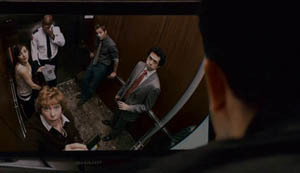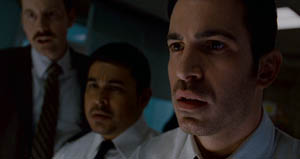|
The devil kills bad people trapped in an elevator. That's it. That's the movie. Wait, what's that you say? No fair, no "spoilers ahead" warnings or any other heads-up notifications? Don't blame me. The movie itself tells us as much straight off the top. A narrator, whom we will later, much to our chargrin, be forced to meet, tells us of an old story his mom used to tell when he was a child, about how the devil would gather some bad people together, pretend to be one of them and kill them one by one. (Whether or not DFACS later arrived to take him away from this old loon isn't related herein.) I don't know how this makes sense; dead evildoers can't do any more evil, so the devil seems to be working against his own purposes here, but sense isn't something you should expect to find here in any permutation. 
Police respond to the scene of a suicide which seems, after a bit of investigation, to have occurred under somewhat mysterious circumstances. These are fairly unlikely, and not even really important overall, but at this stage of the story I'm willing to forgive such foibles in the hopes that they will lead somewhere interesting, a sense of goodwill which will wear unsupportably thin before the film is near over. In a nearby skyscraper, a group of five unlikeable jerks attempts to take the express elevator to the top floor, gets stuck, and rapidly begins to wear on each other's nerves, along with ours. When one ends up dead, the police are called in, with a cloud of suspicion cast over the other four passengers. A security guard at the building, and our spoiler-spilling narrator, however, has other ideas, about which he begins to unctiously pontificate at great length. As we've already heard his explanation read over the start of the film, it's redundant to us, and therefore doubly annoying, but our cop-on-the-case finds him already irritating enough to attempt to have him removed from the scene-the cop is level-headed and reasonable, opining that "People are bad enough. We don't need the devil." Because he is sensible and the guard sounds like a barking madman, we know one must be wrong and the other right, respectively, because this is not reality, but rather the crazed blatherings of M. Night Shyamalan. No, M. Night did not direct this film. The script is credited to Brian Nelson, based on a story by Night. But it's patently obvious that Shyamalan had a personal hand in the screenplay, credited or not. The ham-handed preaching that interrupts the action on innumerable occasions could come from no other source, and frankly calls the whole wretched enterprise into question; critics have long noted the disparity between Shyamalan's directing skills (good) and his writing skills (veering between decent and atrocious). Why anyone would possibly want a film where the man contributed only the far weaker of his abilities is beyond me. The deleterious effect of his writing and stupid-ass worldview hamstrings the film in a most unpardonable manner; in order for the story to be doing anything at all in between the killings, our hapless cop must spend his screen time on developing theories and chasing leads which we already know are all pointless, the suspect on this crime having been laid bare from the start. Desperately we hope for a dog-leg turn into the realm of the reasonable, as the plot's primary underpinnings are pillaged rather obviously from Agatha Christie's novel And Then There Were None, a classic closed-room mystery requiring no fantastical foofery in its explanation. Sadly, while shamelessly lifting the novel's primary twist (one of two here, apparently making up for his last few films which lacked any), Night hasn't kept the real-world explanation that made the book such a greater accomplishment. 
Devil is a testament to the concept of failure. None of the characters here, save our running-in-place policeman, are at all likeable. As the fodder in the elevator are all there to be punished for evil deeds (again, why is the devil punishing evil?) we can't care about their fates. We can't enjoy trying to unravel a mystery, as none is presented. The film is in no way scary, which is a pretty considerable failing for its particular genre. It criminally wastes the talents of Caroline Dhavernas, a very talented actress relegated to a thanklessly insubstantial supporting role. And Night's philosophy is as kindergarten-level as ever: the existence of the devil would no more prove the existence of god than the existence of Pegasus would prove the existence of Medusa. Supernatural fiction is all fine and dandy, but for Night it's never enough to simply use it as a means of entertainment; it invariably becomes a soapbox from which he can shout out his clarion call to turn from logic and reason, and embrace idiotic superstition instead, one of the worst mission statements a man can write for himself. Devil, on the other hand, is merely one of the worst things he's managed to write for someone else. -review by Matt Murray
|
|
||||||||